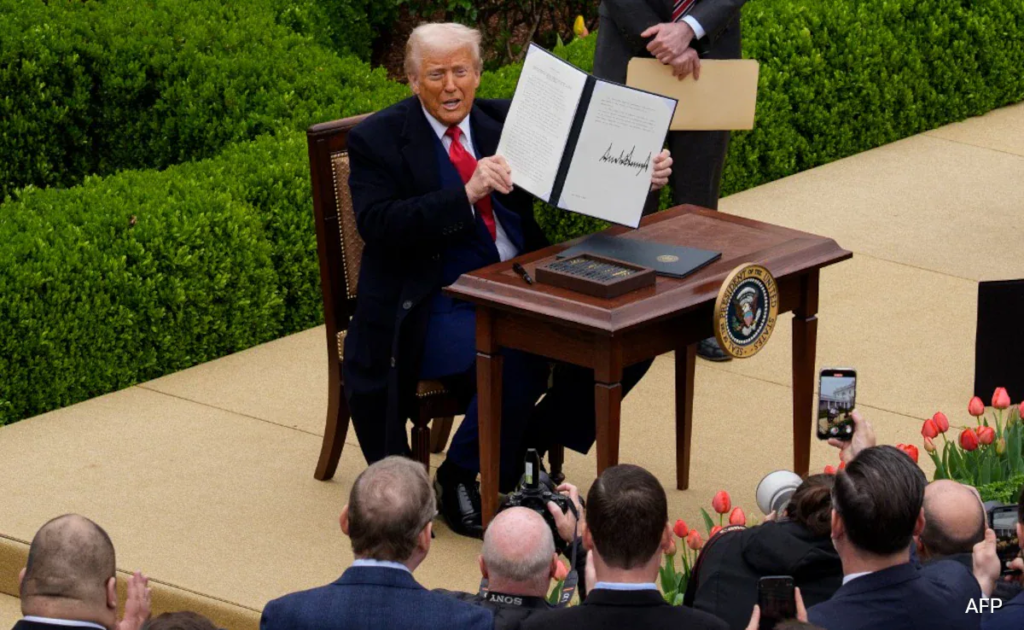President Donald Trump’s tariff announcement on April 2, U.S. airline bookings experienced a dramatic drop, showing just how quickly consumer behavior can change in response to economic uncertainty. In the days following the announcement, airline bookings across major U.S. carriers fell by almost 6%, signaling that the administration’s import taxes were influencing discretionary spending almost immediately.
According to data from Consumer Edge, a company that analyzes consumer spending, the decrease in bookings was particularly noticeable among the “big four” U.S. airlines—American Airlines, Delta Air Lines, Southwest Airlines, and United Airlines.
These airlines are typically seen as the backbone of U.S. air travel, and their performance often reflects broader trends in consumer spending. The sharp drop in bookings was a sign that consumers were holding back on non-essential expenses, such as air travel, in response to the tariffs.
Delta Air Lines, the most profitable airline in the U.S., was one of the first to react to the changes. It announced that it was withdrawing its financial guidance for the year, citing “broad macro uncertainty” caused by the decrease in domestic travel demand.
The airline also mentioned that the uncertainty brought about by the tariffs was making it difficult to predict how the year would unfold. Similarly, Frontier Airlines, a low-cost carrier, also revised its financial outlook, reducing its forecast due to the uncertain environment and decreased consumer confidence.
As of now, the Dow Jones U.S. Airline Index, which tracks the performance of major U.S. airlines, has fallen by 32% since the beginning of the year. This sharp decline reflects the growing concerns within the airline industry about the economic impact of the tariffs, which have led to a slowdown in travel demand. The strong year that airlines had initially expected in 2025 now seems increasingly uncertain, as more and more consumers pull back on spending.
The immediate effect of the tariff announcement on airline bookings highlights the sensitivity of consumer behavior to changes in economic conditions. According to Michael Gunther, Vice President and Head of Insights at Consumer Edge, the data from the four days following the tariff announcement shows a noticeable drop in bookings growth.
“It’s reasonable to assume it was related to the tariff announcement and the uncertainty it introduced,” Gunther said. This suggests that the tariffs have directly influenced consumers’ decisions to scale back on discretionary spending, especially on non-essential services like air travel.

However, Gunther was quick to point out that the economy was already showing signs of stress before the tariffs were introduced. Consumer spending had been slowing down in many areas, including apparel, accessories, footwear, beauty products, and luxury goods, long before the tariff news broke.
This suggests that while the tariffs may have exacerbated the situation, weakening consumer demand was already a factor that airlines and other businesses were dealing with in the months before the announcement.
In fact, data from Bloomberg Second Measure reveals that U.S. consumer spending on air travel and hotel bookings dropped by 10% and 6%, respectively, in February 2025 compared to the same period last year. This further underscores the broader trend of slowing consumer spending in discretionary categories.
The unique nature of airline booking data makes it particularly useful for understanding consumer behavior. Airline bookings are often paid for upfront, meaning that credit card statements reflect travel intentions in real-time.
When a consumer books a flight, the charge shows up on their credit card statement almost immediately, giving a clear picture of their spending habits. Hotel bookings, on the other hand, are often more difficult to track because payments can be made either upfront or at the end of the stay, making it harder to get a precise read on consumer behavior.
Gunther explained that this immediate reflection of spending through airline bookings is a valuable tool for understanding shifts in consumer sentiment. “The good thing about the airline data is it’s actually reflecting intention, and it’s a much better real-time view of how people feel,” he said. In other words, the data from airline bookings provides an accurate snapshot of consumer confidence and willingness to spend on travel.
Moreover, Gunther noted that the trend of decreasing airline bookings aligns with anecdotal reports of panic buying and fear-driven spending behavior. “We’ve been hearing a lot of anecdotes about panic buying and things like that,” he said. “And now we see some of the anecdotes confirmed with hard, actual spending data.” The data from Consumer Edge offers hard evidence of what many were only speculating: that the uncertainty caused by the tariffs has led consumers to delay or scale back on their travel plans.
Looking forward, it remains to be seen whether this booking decline will continue or if the trend will stabilize in the coming weeks. Gunther indicated that it would be interesting to see whether consumers who deferred booking flights in the wake of the tariff announcement would eventually return to making their travel plans.
“It’s going to be interesting to see whether or not any of Wednesday’s announcements end up stabilizing this trend a little bit,” Gunther said. “Whether folks who deferred booking decide, ‘Okay, I’m ready to do it now,’ but we’ll be watching the data closely in the weeks ahead to see if that happens.”
As the situation unfolds, analysts will pay close attention to the evolving data to determine whether the tariff-induced drop in bookings is a temporary blip or a longer-lasting shift in consumer behavior. The airline industry, already grappling with broader economic pressures, will look for signs of recovery or further decline as the year progresses.
President Trump’s tariffs have already significantly impacted U.S. airline bookings, signaling a shift in consumer behavior that may continue to influence the travel industry for months to come. With rising uncertainty and declining consumer confidence, airlines and other sectors are likely to continue facing challenges as the economic fallout from the tariffs unfolds.
Disclaimer: This article has been meticulously fact-checked by our team to ensure accuracy and uphold transparency. We strive to deliver trustworthy and dependable content to our readers.








